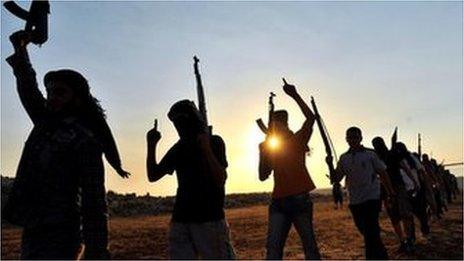How anti-Muslim sentiment hit one Australian
- Published
Youth worker Arif Hussain Khan: "It was a tirade of abuse, of threats against my life and the lives of Muslims"
At the end of September Arif Hussain Khan, a former refugee from Afghanistan who has lived in Australia for more than 20 years, was quietly praying in a park in Wollongong, south of Sydney, when he was confronted by a middle-aged woman.
"As the screaming and the yelling became louder and louder, I started to recognise what this woman was saying," said Mr Khan, a 26-year-old youth worker.
The woman called him a terrorist, told him to go back and fight for extremists in Syria and yelled racially-charged, expletive-filled comments at him.
"It just kept going on and on," he said. "It was just a tirade of abuse and threats - threats again my life and against the lives of Muslims."
"I started getting really upset because I started feeling really isolated, I started feeling separated from, I guess, an accepted version of what an Australian should be."
Rising attacks
Mr Khan isn't alone. Campaigners are reporting a sharp rise in anti-Muslim attacks, amid heightened concerns over security.
Last month police carried out Australia's biggest counter-terrorism raids, in response to an alleged plot by Muslim extremists to kill members of the public. Threats made against Australia by the radical Islamic State group are also thought to be fuelling the hate.
A list of anti-Islamic assaults and acts of intimidation is being compiled by the Muslim Legal Network, including threats made against the Grand Mufti of Australia.
"In one case, a western Sydney mother and her baby were spat on and her pram kicked. In another, a man in Perth tried to rip the scarf off a woman's head. Several mosques around the country have been threatened, egged, vandalised and a pig's head impaled on a cross," said Mariam Veiszadeh, a lawyer and Islamic community spokesperson.
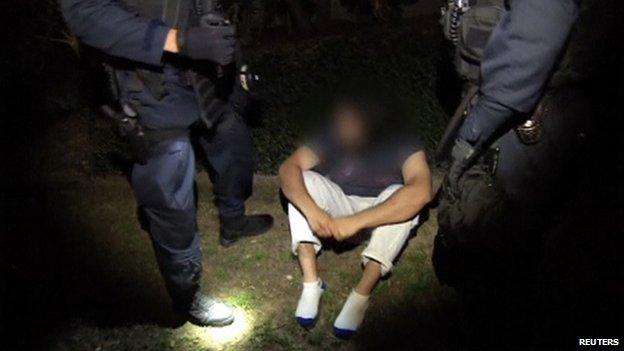
Australia carried out a major anti-terror sweep on 18 September, arresting at least 15 people

On Monday three men, one wearing a Ku Klux Klan outfit, called for a ban on the full-face Islamic veil
Most recently, on Monday, three men wearing a Ku Klux Klan outfit, a motorcycle helmet and an Islamic face veil tried to enter parliament in a call for a nationwide ban on the full-face Islamic veil. After a recent controversy over the issue, they said their aim was to highlight discrepancies over who was allowed access to parliament with a covered face.
At the weekend, mosques around Australia opened their doors to the public in a move aimed at promoting religious harmony and mutual understanding.
"There is a great sense of anxiety among the Muslims at the moment," Shaykh Wesam Charkawi, an Imam at the Lakemba mosque in Sydney, told the BBC.
"There is also a great level of fear. People don't know what the future holds. At the end of the day, we feel so ostracised. It is like there is no air to breathe."
Throughout the day, a steady stream of visitors entered the ornate heart of one of the biggest mosques in Sydney, quizzing their guides about the differences between Shia and Sunni Islam and why women wear the hijab.
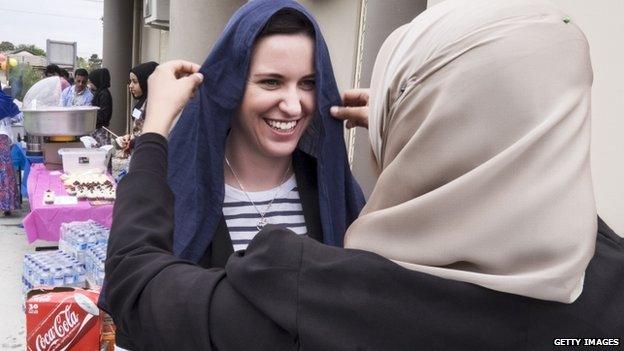
Mosques across Australia opened their doors over the weekend to dispel misconceptions about Islam
There was also discussion about how to stop the young becoming poisoned by radical ideologies.
A recent Islamic State propaganda video featuring Abdullah Elmir, a teenager from western Sydney, has heaped more pressure on Australian Muslims. Here was one of their own, who ran away from home earlier this year, making threats surrounded by dozens of heavily-armed fighters.
"They must be completely devastated, as I know many in this community are, by seeing their young people taken up in this," said Immigration Minister Scott Morrison, who attended the open day at Lakemba.
"Initiatives like today are about supporting this community to get the right and positive message out to their young people, and to the broader community, about what Islam is about," he added.
'Tackling the problem'
In Canberra, the government has insisted that the Islamic community must not feel marginalised or abandoned, and police say they are tackling the problem.
New South Wales police "have arrested and charged a number of people over alleged hate-crimes and these cases are currently before the courts", the force said in a statement.
In Queensland, a 34-year old man has been charged with spray-painting offensive messages at an Islamic prayer centre.
In Victoria, police said although official figures did not show a marked rise in racist crimes, they could be masking the true extent of unreported attacks on Muslims. All incidents of "racism, discrimination or vilification based on religion, culture or nationality" would be taken seriously, they said.
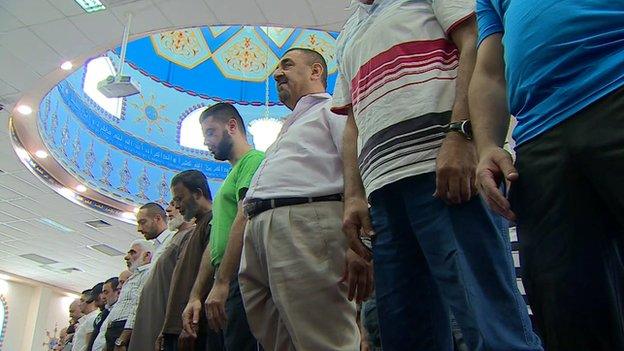
Australia's Muslim community comprises some 2.2% of the population
'Loudest noise'
Amid the fear and mistrust, there are some positive signs, however, that broader society is not standing by while the abuse continues.
While social media has allowed poisonous prejudice to spread, it has also allowed others to vent their frustrations against those responsible for victimising Muslims.
Two skateboarders who went to the aid of a Muslim mother and daughter who were being attacked in the port city of Newcastle have been honoured by the local Imam for their courage.
"I think there is a lot of tension in the community," said Silma Ihram, from the Australian Muslim Women's Association. "On the flip side, there have been many instances recorded where genuine Aussies have stepped forward when there is intimidation occurring to protect the vulnerable."
As for Mr Khan, other people in the park in Wollongong did come to his aid. One had already called the police and another asked him if he was OK, and apologised.
"The majority of Australians are great - accepting and really tolerant of difference views and opinions," he said. "But unfortunately it's the minority among any community that makes the loudest noise."
- Published27 October 2014
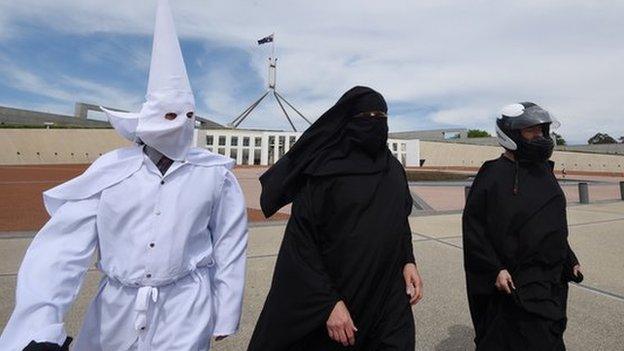
- Published20 October 2014
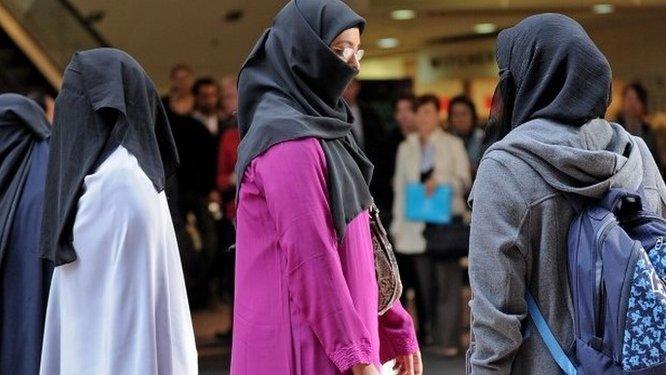
- Published18 September 2014
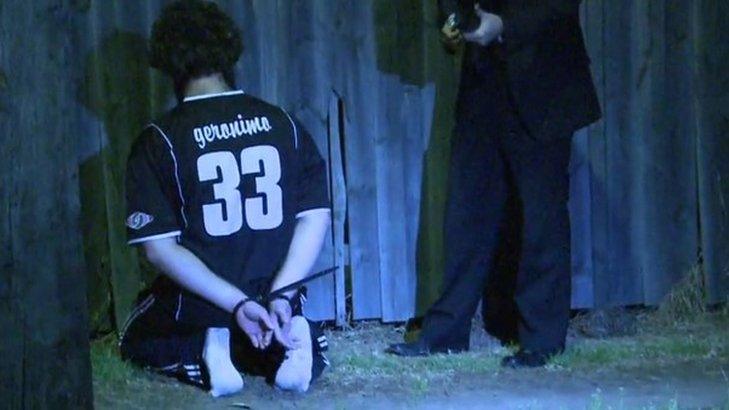
- Published12 March 2015
